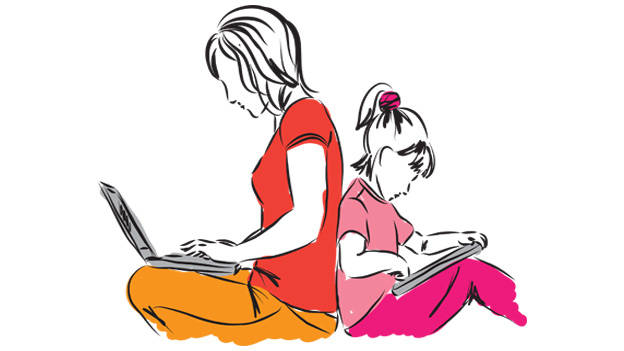Myth debunked: Working moms raise champion kids

It is often assumed that working mothers often struggle to establish a balance between work and home. As a result, if a woman carves a successful career, the next obvious conclusion is that it must be at the cost of domestic responsibilities, and the individual must have not done a good job raising their children. Working mothers have long struggled to fight these assumptions working against them, but now they have a solid backing to their defence.
A recent Harvard Business School Paper has debunked this popular yet flawed notion, by stating that working mothers have more successful daughters and more caring sons. The study, which was undertaken with 50,000 adults in 24 developed countries, concluded that "daughters of working mothers completed more years of education, were more likely to be employed and in supervisory roles, and earned higher incomes” and "sons of working moms spent seven and a half more hours a week on childcare and 25 more minutes on housework". Other major findings of the paper are as follows:
- Adult daughters of working moms were, on average, paid around 4% more than their peers, even after adjusting for levels of education and prevailing social attitudes, and were much more likely to have been promoted into managerial positions.
- One in three daughters who were exposed to maternal employment were in managerial posts, compared with only one in four of those with non-working mothers
- Adult daughters of employed mothers were 16% more likely to hold supervisory responsibility in their jobs than women raised by stay-at-home mothers
- While adult daughters of employed mothers spent less time on housework, maternal employment had no effect on their involvement in caring for the family
- Effects of maternal employment on adult sons were non-significant, which suggests that working mothers provide role models that affect their daughters’ gender attitudes and choices without corresponding negative effects on their sons.
Kathleen L McGinn, lead author of the study, noted that the effect on daughters’ careers of mothers working was particularly marked in the UK and US, where public attitudes to career equality could be more of a barrier than in some European countries such as Finland and Denmark. She has been quoted saying, “All of us grow up with a set of expectations about what we're supposed to do. Role modelling is a way of signalling what's appropriate in terms of how you behave, what you do, the activities you engage in, and what you believe. We did expect that it would effect employment but we didn’t expect that it would affect supervisory responsibility. What I take away is that employed mothers create an environment in which their children’s attitudes on what is appropriate for girls to do and what is appropriate for boys to do is affected. When you go to work, you are helping your children understand that there are lots of opportunities for them."
The study will go a long way in easing the guilt that several working mothers go through, wherein they believe that their absence during formative years of their childrens’ lives will have a detrimental impact on how they will turn out to be, more so in India, where working mothers are under added pressure of acing both the responsibilities. However, the study shows that working mothers successfully inculcate traits like strong work ethic, independence, resilience, and prepare their children better to take on the world.
However, scholars and experts have raised questions in the way the conclusions have been drawn, saying that a successful career is not equal to being successful in life, and the study focuses too much on jobs and employment. This is based in the fact that the working definition of ‘better adult’ almost exclusively focuses on the employment prospects of the individual. McGinn explained to Business Insider that the study doesn’t pronounce a verdict whether a working mother is deemed right or wrong. She explained, “It's not that it's right or wrong for women to work. It's that there's a set of options that seem fully available. You can get exposure to non-traditional gender role models in lots of ways. You garner roughly the same benefits by having friends whose moms work. The important piece here is that you're offering a set of alternatives around what's appropriate behaviour for boys and for girls, and that those alternatives aren't constrained by really tight gender stereotypes."
The study, if nothing has intertwined the gender debate with the role of working mothers, and how the latter has an important effect on how children understand the roles and responsibilities that their mothers juggle. Although questions are being raised about the soundness of the study, it remains to be seen whether the generation that is brought up by working mothers, especially in India, lives up to the expectations lined up for it.










